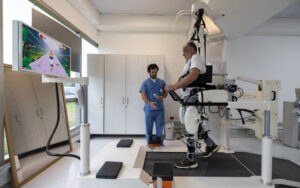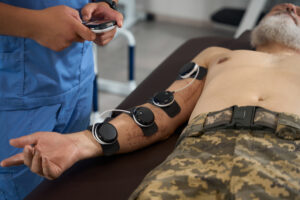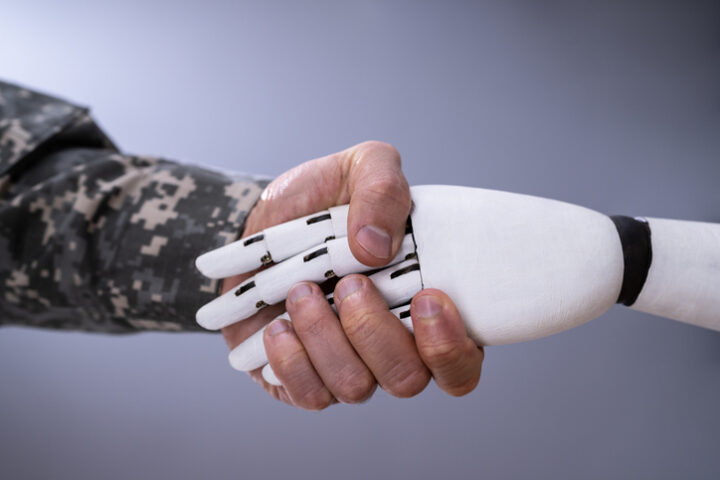Technology and the American military have always gone hand in hand. The defense industry is one of the biggest sources of breakthroughs in everything from computers to medicine. The internet emerged from DARPA research; the Global Positioning System that guides turn-by-turn direction systems was originally developed for military use.
So it’s not hard to trace the evolution of artificial intelligence back to military investments. According to a Brooking’s Institute study in 2022, almost half of AI development contracts and almost 90 percent of all federal funding in the field come from the Department of Defense.
Artificial intelligence in military applications will radically reshape armed conflicts. The future holds autonomous drone weaponry, tactics shaped by machine learning algorithms, and satellite surveillance that picks out patterns from hundreds of miles overhead.
For military members today, though, the biggest impacts of AI will probably come after they are discharged. Whether it’s through professional interaction on the job or through new AI systems developed by the Department of Veterans Affairs (the VA), American military veterans are being discharged into a future where AI will be all around.
What Is AI and How Will It Impact Military Veterans?
 Artificial intelligence is the ability of computerized systems to approach or exceed the reasoning skills and critical thinking process of humans. While most computer programs are linear, able to explore only the branches of logic that have been programmed into them, AI has the almost magical capability of exploring new information and drawing new conclusions.
Artificial intelligence is the ability of computerized systems to approach or exceed the reasoning skills and critical thinking process of humans. While most computer programs are linear, able to explore only the branches of logic that have been programmed into them, AI has the almost magical capability of exploring new information and drawing new conclusions.
That fuels everything from improved image recognition to an ability to parse and reply to random sentences in any language. With the right training data behind it, AI has the ability to learn and improve over time in a way that is entirely new to computers.
The headlines aren’t shy about trumpeting the capabilities and coming dominance of AI-based systems. But how will those changes affect the VA and the veterans it serves?
Military Veterans Have a Lot to Look Forward to in VA Artificial Intelligence Efforts
 According to the VA’s official 2021 Artificial Intelligence strategy, the department is uniquely suited to benefit from AI advances due to its comprehensive combined set of financial, medical, and administrative databases for veterans. These are just the sort of juicy meal that machine learning algorithms get the most benefit from digesting. They are able to combine different types of data and records to come up with insights that humans would never stumble into.
According to the VA’s official 2021 Artificial Intelligence strategy, the department is uniquely suited to benefit from AI advances due to its comprehensive combined set of financial, medical, and administrative databases for veterans. These are just the sort of juicy meal that machine learning algorithms get the most benefit from digesting. They are able to combine different types of data and records to come up with insights that humans would never stumble into.
The department plans to use that ability to the advantage of vets tapping into every kind of service offered. The official AI strategy calls for incorporating AI to improve veteran outcomes across the entire spectrum of benefits and services the agency offers.
Veteran mental health service may become faster and easier to access with artificial intelligence behind it.
That means, in some way, shape, or form, just about every veteran in the country will end up counting on AI. As of early 2024, the VA has identified over 100 potential AI use cases covering everything from evaluating potential suicide risks to exploring surgical outcomes among vets who live in rural areas. See how some of them may revolutionize the post-discharge world for service members.
Veteran’s Healthcare and AI
 One of the biggest concerns for veterans is healthcare. It’s also the single largest focus for the VA. With 9.1 million patients, it’s the largest integrated healthcare system in the United States. Nearly 40 percent of the department’s budget goes into medical care services.
One of the biggest concerns for veterans is healthcare. It’s also the single largest focus for the VA. With 9.1 million patients, it’s the largest integrated healthcare system in the United States. Nearly 40 percent of the department’s budget goes into medical care services.
It’s also one of the biggest resources used by vets for their healthcare needs. CDC data from 2020 found that almost half of veterans use some form of VA healthcare to meet part of their medical needs.
Healthcare is also one of the fields in which AI is having a major impact already. That’s only expected to grow, as the great bump of Vietnam-era vets approach their 70s and find their healthcare needs increasing.
At the same time the patient population and their service needs are increasing, however, severe staffing shortages threaten quality of care. Over 90 percent of VA facilities reported nursing shortages in 2022, and almost 90 percent had shortages of other medical officers.
AI has the potential to help cover those gaps. It may well improve care and outcomes at the same time.
VA Medical Science Efforts Get a Big Boost From AI
 A big piece of the VA AI strategy revolves around using AI to improve medical outcomes. The department is already using machine learning in computer vision to improve diagnostic precision and treatment in oncology. The Office of Research and Development is taking advantage of the big scope of data to train systems to spot tell-tale signs of cancerous growth in imagery to catch cancers early.
A big piece of the VA AI strategy revolves around using AI to improve medical outcomes. The department is already using machine learning in computer vision to improve diagnostic precision and treatment in oncology. The Office of Research and Development is taking advantage of the big scope of data to train systems to spot tell-tale signs of cancerous growth in imagery to catch cancers early.
The same ability to scan big data and find common threads in apparently unrelated information is expected to lead to better planning and screening, as well. For example, AI tools might find that vets from certain units or who served in specific theaters at certain times have elevated risks of certain diseases.
Scattered across the country after discharge, those patterns may never be clear to their local physicians. But a system can flag them proactively for screening and early treatment, which will almost certainly improve outcomes… saving lives long after their tour on the battlefield.
VA Healthcare Will See Increasing Telemedicine Capabilities From AI
 The fact that military members are drawn from every corner of the country is a source of strength for the Armed Forces. But it presents VA service providers with a challenge: how to provide excellent medical and counseling services across the country on a limited budget.
The fact that military members are drawn from every corner of the country is a source of strength for the Armed Forces. But it presents VA service providers with a challenge: how to provide excellent medical and counseling services across the country on a limited budget.
AI can boost the capability and expanse of telemedicine services to reach even the most remote of vets.
At the most basic level, AI tools can provide web or phone-based initial screening and diagnostics for veterans. With a skilled nursing shortage, this should mean faster service. The new abilities of generative natural language processing (NLP) AI mean they can carry on conversations and ask follow-up questions much the same as a human would do.
AI can allow telehealth systems to be tuned specifically to vulnerabilities and issues that are unique to the veteran population.
In some cases, telemedicine for vets may go hands on with new AI technologies. Telemonitoring systems are already in use, sending vital statistics to healthcare facilities for review by medical professionals. AI can expand the uses and accuracy of remote monitoring by providing unblinking 24/7 evaluation of life signs. It can alert providers to potential problems early or even reach out to vets when anything unusual shows up.
These uses of AI can keep veterans out of hospitals and in their homes. That reduces the load on the strained VA health system while also allowing vets the comfort and quiet that comes with receiving treatment in their own home and close to family.
Veteran Access to Care and Services Will Come through Growing AI Options
 Of course, healthcare is such a big concern for veterans because being in the nation’s military is a dangerous job. Close encounters with blasts, shrapnel, and bullets have lasting effects on many veterans. As of 2022, almost 30 percent of veterans are on disability at some level.
Of course, healthcare is such a big concern for veterans because being in the nation’s military is a dangerous job. Close encounters with blasts, shrapnel, and bullets have lasting effects on many veterans. As of 2022, almost 30 percent of veterans are on disability at some level.
That means facing challenges in accessibility and performing daily living activities that most people never have to meet. From traumatic brain injury to the loss of limbs, American veterans face every kind of disability challenge.
There’s no one-size-fits-all accommodation for these issues. Yet there is a duty that the country has to give veterans the most normal life they can have after such tragedy.
The reasoning and flexibility that comes with AI systems can put technology to work on the unique challenges that come with veteran PTSD and other disabilities.
As one example, computer vision technology combined with the power of natural language processing has already allowed the creation of smartphone apps that can perform real-time sign-language translation. Signing is a valuable communication tool for deaf vets, but it’s not a common skill in the public at large. Finding translators can be tough. But AI can translate to or from ASL (American Sign Language) just fine… even for phone calls using the built-in smartphone camera.
Veteran Mental Health Care Can Expand With AI Behind It
 One of the very first chatbots ever made was designed to simulate a mental health therapist—and it was built by a veteran.
One of the very first chatbots ever made was designed to simulate a mental health therapist—and it was built by a veteran.
Joseph Weizenbaum was a Jewish refugee from Nazi Germany when he arrived in the United States in 1936. But he headed back, in uniform, as a member of the U.S. Army Air Corps, to help defeat Hitler only a few years later.
After the war, and a degree that came courtesy of the newly passed G.I. Bill®, Weizenbaum began researching the new field of digital computers at MIT. Excited at the possibilities, he put together an interactive program called ELIZA that could mimic a psychotherapist. People who used it were amazed; they told it things they might never reveal to a human therapist.
Around 15 percent of American service members deployed to Iraq or Afghanistan have been reported to be affected by depression or post-traumatic stress disorder.
ELIZA was a marvel for the 1960s but today’s chatbots are far more capable. And they are already making inroads in offering reflective, talk-based solutions for vets struggling with mental health issues. Some organizations are even tuning their chatbots specifically for the kind of challenges faced by veterans.
AI also works as a screening tool to identify vets at risk of suicide. A program called REACH VET is used to find common threads of risk and notify support groups about vets who could use mental health outreach. Since veterans are notably reluctant to ask for help, this is a critical step in getting them the care they need.
VA Education Benefits Coming From AI Tools
 While the focus at the VA is on using AI in research and health outcomes, the technology is also expected to change the field of education. That’s inevitably going to have a big impact on the nearly 900,000 vets each year who tap into the generous educational benefits their service has brought them.
While the focus at the VA is on using AI in research and health outcomes, the technology is also expected to change the field of education. That’s inevitably going to have a big impact on the nearly 900,000 vets each year who tap into the generous educational benefits their service has brought them.
Like Joseph Weizenbaum, many veterans have used the generous education funding from the G.I. Bill® to launch new careers. Those funds can go toward almost any kind of education from any American college or university. But all the choices can themselves be a pretty tough field to navigate. Vets can have trouble understanding where their in-service education will count for college credits, or how they can beef up their knowledge before they are even discharged.
AI can step in with personalized study plans to make the process easier. AI can be a tutor, developing lessons tailored to individual skill levels and interests. It can be a perfect tool for troops on deployment who can’t otherwise attend classes in person.
It also has the potential to help sort out the famously challenging math around G.I. Bill® benefits. Calculating how much support is offered at different schools, in different locations, and for how long is complex enough that it has led to court cases and lawsuits. But AI can figure out such matters instantly and help vets map out the best way to maximize their benefits toward their individual goals.
Careers for Veterans Will Be Easier to Find With AI Tools
 Another long-standing role that the VA has played for American service members is that of career counselor. It can be tough moving from the structured and organized world of the military to a freewheeling civilian lifestyle. Job skills and career paths aren’t mapped out clearly. Even the language seems different.
Another long-standing role that the VA has played for American service members is that of career counselor. It can be tough moving from the structured and organized world of the military to a freewheeling civilian lifestyle. Job skills and career paths aren’t mapped out clearly. Even the language seems different.
TAP, the VA Transition Assistance Program, delivers information, resources, and tools to make that move easier. In fact, it’s a mandatory program for service members being discharged today.
Transition from military to civilian life can be the hardest part of service life.
Career counseling professionals can be in short supply, though. It takes time and a personal touch to get newly discharged vets lined up on the right track. And it’s not always a one-shot deal. Even vets who have been out for a while can use follow-up and guidance as they make their way in a new world of civilian employment.
AI has a lot to offer in terms of personalization and information. It can take a look at service records and training achievements to help identify strengths. It will be able to instantly identify eligibility for various benefits and services. And it can stick with vets for instant access or updates throughout their discharge and assimilation process.
Finding a Civilian Career With Ai-Powered Job Search
 One of the biggest parts of that transition is finding a way for veteran’s to support themselves in the civilian job market. Military skills aren’t always directly transferable. Yet employers love the discipline and commitment that veterans bring to work.
One of the biggest parts of that transition is finding a way for veteran’s to support themselves in the civilian job market. Military skills aren’t always directly transferable. Yet employers love the discipline and commitment that veterans bring to work.
AI with strong language skills can help vets highlight their strengths through resume building and polishing. They can take goals and put together a precisely tailored cover letter and application for specific jobs.
It may also help with the job search process. Some of the earliest uses of AI have been in recommendation systems. These are the kind of process that takes something like a Netflix viewing history and comes up with the next show to binge on. Something similar can happen with jobs. Given a vet’s service record and interests, AI-powered job search engines can spit out the best matches for a fulfilling career.
The VA is already jumping into this use of AI, offering webinars to help military members and vets get acquainted with AI resources useful in the job hunt.
Financial Planning for Veterans AI Tools May Be Coming Soon
 Financial management is another skill that discharged vets have to pick up quickly. Commanders aren’t notified if you start getting into money troubles. There’s no unit financial NCO to turn to for counseling.
Financial management is another skill that discharged vets have to pick up quickly. Commanders aren’t notified if you start getting into money troubles. There’s no unit financial NCO to turn to for counseling.
AI is already being worked into some of the most common offerings from big financial services and planning companies like Vanguard. These roboadvisors take a deep look at your current accounts, goals, and the state of the financial markets and offer suggestions for investment and savings allocations.
Other AI-driven systems can help you with budgeting, offer nudges to allocate for the unexpected expenses of civilian life.
VA Administration in General Will Benefit From AI Tools
 AI will impact veterans in more mundane ways as well as the big life-changing medical and educational uses. Some kinds of AI tools may be less flashy, but might have an even greater part in day-to-day support for veterans everywhere.
AI will impact veterans in more mundane ways as well as the big life-changing medical and educational uses. Some kinds of AI tools may be less flashy, but might have an even greater part in day-to-day support for veterans everywhere.
These are the sorts of uses of AI that will filter into every kind of industry and every corner of government. They are the smarter, faster, more fluent children of automated phone customer service trees, website chatbots, spreadsheets, and scheduling software. They will fill in for humans in essential administration and customer service roles that the VA often has a tough time staffing today.
With instant access to all medical and service records for veterans, customer service AI may be able to answer questions faster and more accurately than humans.
In the future, most interactions that vets have with the VA may end up running through AI communication. Whether it’s a chatbot helping look up service records for resume building or a smart phone system that can schedule a medical follow-up, AI has the potential to go to work for vets 24/7/365… just like those veterans stood on call around the clock for their country.
Predictive AI for Military Veteran Planning and Benefits Will Bring New Efficiency
 AI will also play roles that are less clearly aimed directly at individual veterans or groups, but still offers benefits to veterans as a whole.
AI will also play roles that are less clearly aimed directly at individual veterans or groups, but still offers benefits to veterans as a whole.
Those come through the advanced planning and predictive analytics that machine learning has to offer. There have been big previews of the ability of ML algorithms to foresee the future through the field of data science. AI will supercharge these predictions and add to their reliability.
That will allow the VA to do a better job of planning and meeting veteran needs across the country. For an organization that has repeatedly been identified as lacking sustained leadership and has been called out for delays in access to healthcare and other resources, that will be a welcome change.
What Does the Future Hold for AI Used in Military Veteran Support?
 Artificial intelligence is a technology that is barely out of infancy. There’s a lot of unknowns in how exactly it will be used and what exactly it will be able to do. One sure thing is that the potential is huge.
Artificial intelligence is a technology that is barely out of infancy. There’s a lot of unknowns in how exactly it will be used and what exactly it will be able to do. One sure thing is that the potential is huge.
So the future likely holds many innovations in all of the areas noted above. Unexpected but amazing developments in healthcare, including treatment for issues that are common in vets, may come soon. Innovation in training and education may make it easier to learn new skills and transition to civilian jobs without missing a beat. And overall improvements in the efficiency and responsiveness of the VA itself will be most welcome to any vet who had ever been put on everlasting hold.
But the thing about an unknowable future is that it can bring challenges as well as innovations. AI brings some new issues to the table as well as known limitations today. Navigating those challenges and coming up with solutions will take people who both have expertise in the technical details behind AI and the unique culture and needs of the veteran population.
VA Administrators Will Have to Tread Carefully to Maintain Privacy Using AI for Veterans
Since one of the VA’s biggest missions is veteran health care, that makes it a lightning rod for privacy concerns. The Veterans Health Administration is the single largest integrated health care system in the United States, with more than 1,300 facilities and more than 9 million enrolled patients.
The VA also has the largest genomic database with connections to individual medical records in the world.
Storing sensitive medical data and records for almost every American veteran means that the VA is susceptible to huge potential for privacy violations. Since AI draws on vast amounts of information and can tie it together in ways that a human never could, it has the potential to identify characteristics about patients that wouldn’t come out in even the worst kind of conventional data breach.
Strong ethical standards and hardcore cybersecurity are going to be needed to roll out these powerful systems on a big scale.
Many types of generative AI today have another weakness, which is a tendency to make things up. This tendency, called hallucination, can make them a liability in not just sensitive healthcare uses, but even for more mundane tasks like customer service or record keeping.
Education at Military-Supportive Colleges Helps Veterans Transition to Civilian Life
 While veterans are naturally going to feel the impacts of artificial intelligence as part of the VA AI strategy, it’s also worth remembering that they are reintegrating into a world that is going to be going through many changes due to artificial intelligence.
While veterans are naturally going to feel the impacts of artificial intelligence as part of the VA AI strategy, it’s also worth remembering that they are reintegrating into a world that is going to be going through many changes due to artificial intelligence.
Careers for veterans who get ahead of the AI curve will be lucrative and important in that world. So it’s going to be important to take advantage of AI job training or other educational opportunities both in and out of the service.
Civilian jobs in the technology sector will increasingly look for individuals who have degrees in artificial intelligence. Veteran education benefits are a perfect way to earn those degrees.
Military-supportive colleges offer the best bang for the buck for those education benefits. With systems and programs designed to help vets find their feet in the civilian world, they are the perfect way to get a handle on both AI and future careers in any field.






